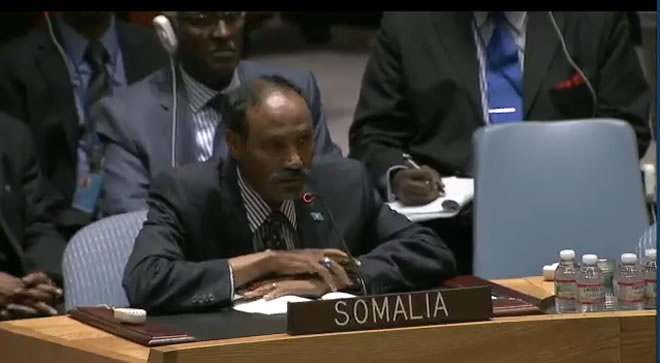 |
|
Somali Foreign Minister Abdirahman Dualeh Beileh

Wednesday, March 05, 2014
United nations: The UN Security Council Wednesday extended an easing of a weapons ban in Somalia, but tightened some restrictions to ensure the arms don't end up in the hands of Islamist extremists.
The council first relaxed the embargo a year ago, but kept restrictions in place for heavy weapons and for sensitive equipment. Weapons purchased throughout the past year continued to require prior notification to UN authorities.
On Wednesday, the council unanimously agreed to continue the current, lighter, restrictions for another eight months, through October 25, though it tightened rules governing the purchase, registration and storage of the weapons.
Britain's UN ambassador Mark Lyall Grant, whose government sponsored the resolution, told reporters the measure "makes very clear that the Somali authorities need to meet strict conditions on the monitoring and reporting of arms imports."
These restrictions aim "to ensure in particular that they do not get into the hands of Al-Shabab," an Al-Qaeda linked militia, he said.
"The risk of arms being imported outside government hands is real," Lyall Grant said, but he emphasized Somalia's government has promised to ensure it "fully meets its commitments."
UN experts responsible for monitoring the arms embargo said in a recent report that there have been "systematic" cases of weapons ending up in the hands Somali chieftains and sometimes Shebab Islamist leaders, as a result of abuses by the Somali National Army.
Mogadishu has long sought the total lifting of the embargo that has been in place since 1992, saying that it needs more firepower to combat the Shebab movement.
The policy is to be reviewed next September, and could be changed -- depending on how well Somali does going forward in managing its arsenal.
The Shebab, the armed wing of the Islamic Courts movement that took over Mogadishu in 2006 after heavy fighting, have lost their strongholds in the south and center of the country, but still control vast rural zones.
The group has stepped up attacks since being driven out of the Somali capital in 2011.
The election in September 2012 of a new president, Hassan Sheikh Mohamud, has raised hopes that Mogadishu may finally be able to govern the country and provide real sustainable institutions, including oversight of its arsenal.
Rights groups, meanwhile, have argued vociferously for the embargo to be fully restored.
"The UN Security Council's relaxing of the international arms embargo on Somalia last year appears to have contributed to a rise in insecurity and human rights abuses that has resulted in hundreds of civilian deaths each month," Amnesty International said in a statement this week.
"The facts speak for themselves," said Michelle Kagari, Amnesty's Africa Deputy Director.
"Security for Somalia's people remains extremely volatile, and the ongoing flow of arms into the country is fanning the flames of armed violence and grave human rights abuses against civilians," she said.
Source: AFP